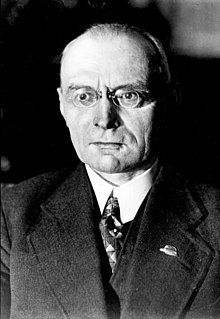 W
WKarl Georg Erwin Walter Caspari was a German military officer, policeman, and leader of a Freikorps militia unit named after him.
 W
WJakob Ritter von Danner was a Bavarian general in the Imperial German Army and the Reichswehr. As commandant of the Munich garrison of the Reichswehr, he was a central figure in putting down the attempted Beer Hall Putsch by Adolf Hitler and the Nazis in 1923.
 W
WTheodor Duesterberg was a leader of Der Stahlhelm in Germany prior to the Nazi seizure of power.
 W
WAlexander Ernst Alfred Hermann Freiherr von Falkenhausen was a German general and military advisor to Chiang Kai-shek. He was an important figure during the Sino-German cooperation to reform the Chinese Army. In 1938, Germany ended its support for China under pressure from Japan, and Falkenhausen was forced to return home. Back in Europe, he later became the head of the military government of Belgium from 1940 to 1944 during its German occupation.
 W
WGeneral Erich Georg Sebastian Anton von Falkenhayn was the second Chief of the German General Staff of the First World War from September 1914 until 29 August 1916. He was removed on 29 August 1916 after the failure at the Battle of Verdun, the opening of the Battle of the Somme, the Brusilov Offensive and the entry of Romania into the war on the Allied side undid his strategy to end the war before 1917. He was later given important field commands in Romania and Syria. His reputation as a war leader was attacked in Germany during and after the war, especially by the faction which supported Paul von Hindenburg. Falkenhayn held that Germany could not win the war by a decisive battle but would have to reach a compromise peace; his enemies said he lacked the resolve necessary to win a decisive victory. Falkenhayn's relations with the Chancellor Theobald von Bethmann-Hollweg were troubled and undercut Falkenhayn's plans.
 W
WWilhelm Josef Franz Ritter von Leeb was a German field marshal and war criminal in World War II. Leeb was a highly decorated officer in World War I and was awarded the Military Order of Max Joseph which granted him the title of nobility. In the Invasion of France, he commanded Army Group C, responsible for the breakthrough of the Maginot Line.
 W
WPaul Emil von Lettow-Vorbeck, also called the Lion of Africa, was a general in the Imperial German Army and the commander of its forces in the German East Africa campaign. For four years, with a force of about 14,000, he held in check a much larger force of 300,000 British, Indian, Belgian, and Portuguese troops.
 W
WOtto Hermann von Lossow was a Bavarian Army and then German Army officer who played a prominent role in the events surrounding the attempted Beer Hall Putsch by Adolf Hitler and the Nazi Party in November 1923.
 W
WCount Maximilian Maria Karl Desiderius de Garnerin de la Thuile von Montgelas was a Bavarian general and diplomat.
 W
WMaximilian Johannes Maria Hubert Reichsgraf von Spee was a naval officer of the German Kaiserliche Marine, who commanded the East Asia Squadron during World War I. Spee entered the navy in 1878 and served in a variety of roles and locations, including on a colonial gunboat in German West Africa in the 1880s, the East Africa Squadron in the late 1890s, and as commander of several warships in the main German fleet in the early 1900s. During his time in Germany in the late 1880s and early 1890s, he married his wife, Margareta, and had three children, his sons Heinrich and Otto and his daughter Huberta. By 1912, he had returned to the East Asia Squadron as its commander, and was promoted to the rank of Vizeadmiral the following year.
 W
WGeneral Adrian Dietrich Lothar von Trotha was a German military commander during the European new colonial era. As a brigade commander of the East Asian Expedition Corps, he was involved in suppressing the Boxer Rebellion in Qing China, commanding troops which made up the German contribution to the Eight-Nation Alliance. He later served as governor of German South West Africa and Commander in Chief of its colonial forces, in which role he suppressed a native rebellion during the Herero Wars. He was widely condemned for his brutality in the Herero Wars, particularly for his role in the genocide that led to the near-extermination of the Herero.
 W
WGuido von Usedom was a German admiral that served in the Boxer Rebellion and World War I. His most notable service was his service in the Naval operations in the Dardanelles campaign.
 W
WAlfred Ludwig Heinrich Karl Graf von Waldersee was a German field marshal (Generalfeldmarschall) who became Chief of the Imperial German General Staff.